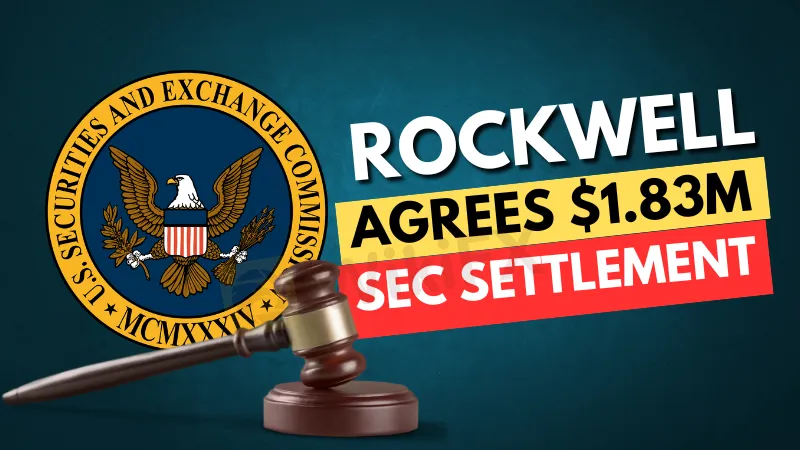简体中文
繁體中文
English
Pусский
日本語
ภาษาไทย
Tiếng Việt
Bahasa Indonesia
Español
हिन्दी
Filippiiniläinen
Français
Deutsch
Português
Türkçe
한국어
العربية
Rockwell Agrees $1.83M SEC Settlement
Abstract:SEC settles for $1.83 million with Brian Sewell and Rockwell Capital over a fraudulent scheme involving 15 students and the non-existent Rockwell Fund.

The US Securities and Exchange Commission settled with Brian Sewell and Rockwell Capital Management for $1.83 million after accusing Sewell of defrauding 15 students of $1.2 million. The case has brought attention to the risks associated with cryptocurrency investments, especially when they come with unverified claims of cutting-edge trading strategies.
The issue originates from Sewell's establishment of the American Bitcoin Academy, an online course that claimed to teach students the subtleties of bitcoin trading. In early 2018–mid-2019, hundreds of his students believed in the Rockwell Fund. This hedge fund was projected to be a game-changing investing platform that would leverage AI and crypto-asset trading algorithms to generate high profits for its investors.
However, the SEC's inquiry into these assertions revealed a quite different reality. The inquiry proved that Sewell's claims were hollow: the Rockwell Fund never existed, and the complex trading tactics he spoke about were never established or applied. The cash gathered from the 15 pupils, totaling roughly $1.2 million, was redirected into Bitcoin ventures. The Bitcoins were stolen from Sewell's digital wallet, causing the assets to be lost.

Given these findings, the SEC filed a lawsuit against Sewell and Rockwell Capital Management for breaching federal securities laws' anti-fraud provisions. The case highlighted the importance of regulatory supervision in the fast-growing cryptocurrency market and the risk of substantial losses from misinformation-based investments.
Sewell and his company settled rather than contest the SEC's allegations. They agreed to pay $1.83 million in fines and prejudgment interest to settle the fraud charges against them. This settlement compensates the affected students and deters future fraud.
The SEC's Division of Enforcement Director, Gurbir S. Grewal, underscored the misleading nature of Sewell's acts, including false guarantees and nonexistent technology that Sewell utilized to entice investors into his scam. This example advises investors against high-return investments, especially in volatile and opaque cryptocurrencies. They should be cautious and critical to avoid such frauds.
Keep up with financial trends, expert opinions, and major developments at https://www.wikifx.com/en/news.html. Click now to stay ahead of the competition!

Disclaimer:
The views in this article only represent the author's personal views, and do not constitute investment advice on this platform. This platform does not guarantee the accuracy, completeness and timeliness of the information in the article, and will not be liable for any loss caused by the use of or reliance on the information in the article.
Read more

Justice Served: Illegal Investment Scheme Ends in RM28 Million Repayment
The Kuala Lumpur High Court has ruled that a Singaporean businessman, Chan Cheh Shin, must return RM28 million to 122 Malaysian investors after the court determined that his investment operations were conducted illegally.

Tokyo Police Arrest 4 for Unregistered FX Trading Scheme
Four men in Tokyo were arrested for running an unregistered FX trading operation, collecting over ¥1.6 billion from 1,500 investors.

Doo Group Expands Its Operations with CySEC License
Doo Financial, part of Doo Group, receives a CySEC license, allowing FX/CFD services in Europe. This strengthens its global presence and regulatory standards.

US Regulators Tighten Oversight on Bank Anti-Money Laundering Efforts
US regulators warn banks of stricter enforcement on money laundering rules, highlighting recent penalties against major lenders like TD Bank.
WikiFX Broker
Latest News
Why Even the Highly Educated Fall Victim to Investment Scams?
Warning Against Globalmarketsbull & Cryptclubmarket
BSP Shuts Down Uno Forex Over Serious AML Violations
ACY Securities Expands Global Footprint with South Africa Acquisition
Tokyo Police Arrest 4 for Unregistered FX Trading Scheme
Rupee gains against Euro
Axi Bids AUD 52M to Acquire Low-Cost Broker SelfWealth, Outbidding Competitor Bell Financial
Crypto Influencer's Body Found Months After Kidnapping
US Regulators Tighten Oversight on Bank Anti-Money Laundering Efforts
Doo Group Expands Its Operations with CySEC License
Currency Calculator


